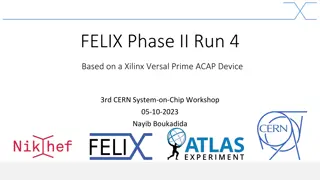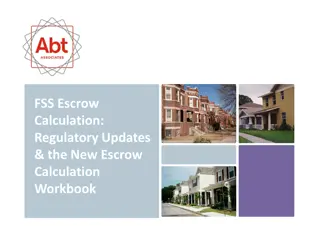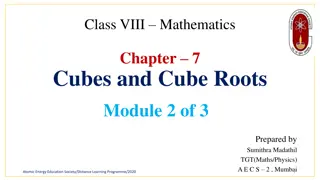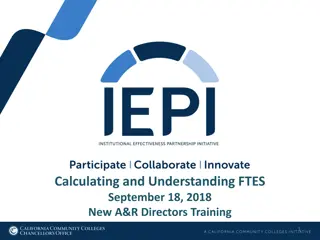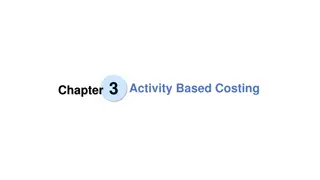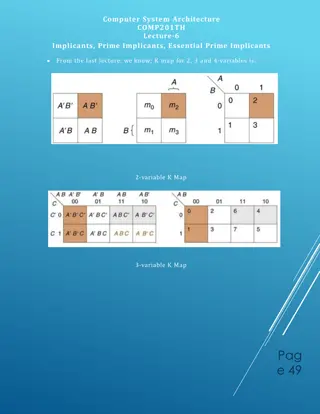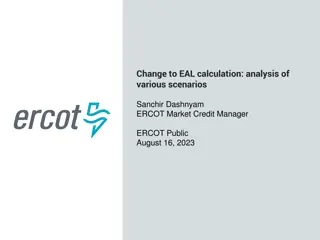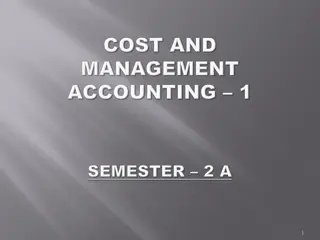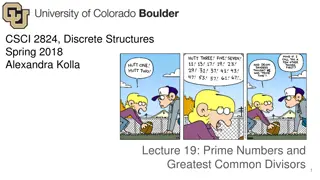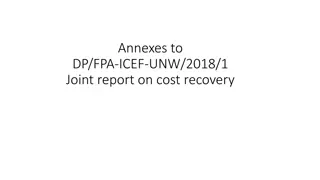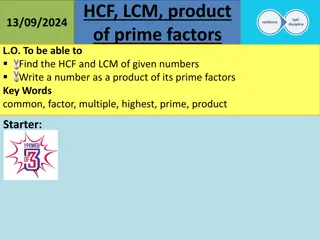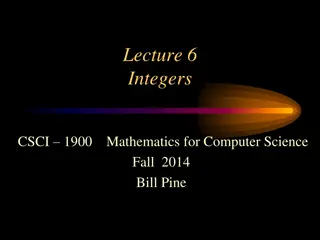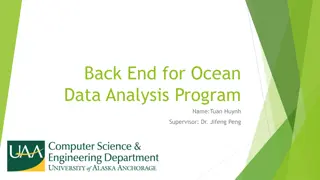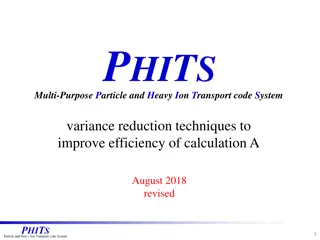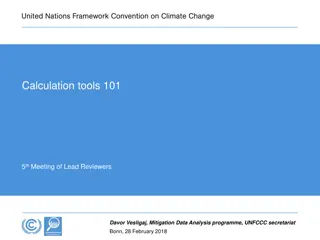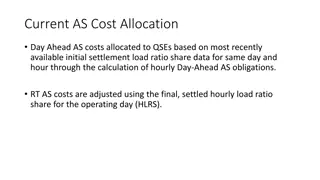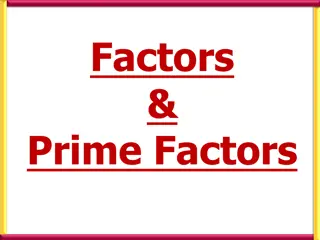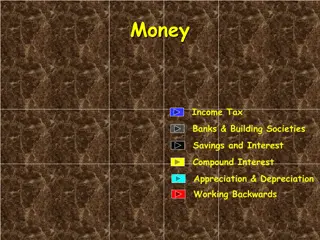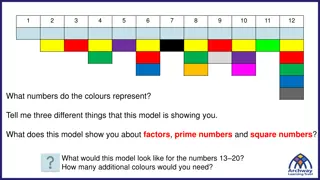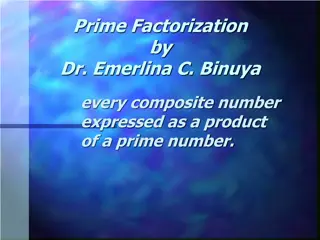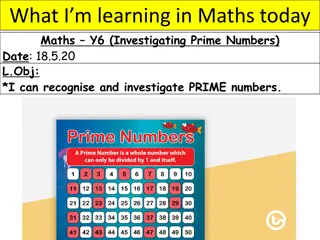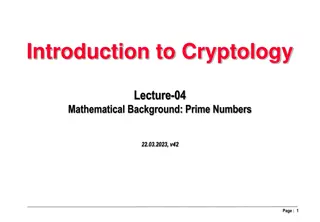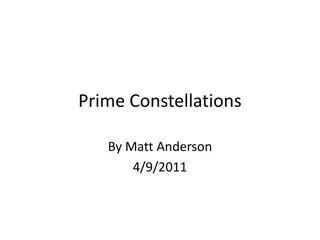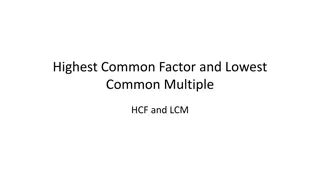FELIX Phase II Run 4 and Versal Prime ACAP Device
Explore the advancements in FELIX Phase II Run 4, leveraging Xilinx Versal Prime ACAP Device, showcased at the 3rd CERN System-on-Chip Workshop. Witness massive improvements in trigger rates, data readout rates, and interactions per bunch crossing. Dive into the hardware details and Versal Prime's c
2 views • 36 slides
Math Quiz and Prime Factorization Concepts
Test your math knowledge with a quiz ranging from square numbers to factorization and explore prime factorization concepts through examples and practice questions involving finding prime factors, highest common factor (HCF), and lowest common multiple (LCM).
0 views • 26 slides
FSS Escrow Calculation and Regulatory Updates Summary
Comprehensive overview of the new escrow calculation workbook, regulatory updates, and changes to the Final Rule for FSS escrow calculation. Key topics include FSS terminology, calculation examples, and important points for locally generated housing funds. The Final Rule changes include uncapped esc
4 views • 9 slides
Comprehensive Cost Management Training Objectives
This detailed training agenda outlines a comprehensive program focusing on cost management, including an overview of cost management importance, cost object definition, cost assignment, analysis, and reporting. It covers topics such as understanding cost models, cost allocations, various types of an
4 views • 41 slides
Prime Cost in Production Accounting
Explore the concept of prime cost in production accounting through detailed statements and calculations. Learn how to calculate prime cost based on raw material purchases, direct wages, expenses, and more. The provided examples illustrate the breakdown of costs involved in producing goods or service
1 views • 20 slides
Academic Senate Resolutions and Low-Cost Thresholds in Higher Education
The Academic Senate addresses the adoption of open educational resources (OER) and low-cost materials to support academic freedom and compliance with legislative requirements. The resolution discusses the definition of low-cost resources and the variability among California Community Colleges in set
3 views • 9 slides
Cost Accounting Essentials
This overview delves into topics such as financial accounting, classification of accounts, cost ascertainment, and management accounting. It covers the meaning of cost, methods and techniques of costing, advantages and limitations of cost accounting systems, and essentials for a robust cost accounti
4 views • 27 slides
Cubes and Cube Roots: Interesting Patterns and Prime Factors
Explore the fascinating world of cubes and cube roots in mathematics with insights on patterns, prime factorization, and more. Discover the relationships between consecutive odd numbers, learn how to express numbers as the sum of odd numbers, and delve into the prime factorization of cubes. Unravel
0 views • 21 slides
Multiples, Factors, and Prime Numbers
Explore the concept of multiples, factors, and prime numbers through examples and explanations. Learn how to identify multiples of a number, determine if a number is a multiple of another, distinguish between prime and composite numbers, and understand the properties of prime numbers. Gain insights
0 views • 30 slides
FTES Calculation in California Community Colleges
California Community Colleges use Full-Time Equivalent Students (FTES) to allocate apportionment revenue based on student attendance. FTES calculation involves factors like clock hours, class hours, passing time/breaks, and multiple-hour classes. Understanding these components is essential for educa
2 views • 35 slides
Cost Control and Cost Reduction Strategies in Business: Understanding Implementation Challenges
Understanding the concepts of cost control and cost reduction is crucial for businesses, but implementing them can be challenging. This chapter explores the influencing factors for success in cost control and reduction, emphasizing the importance of cultural aspects, leadership, and management appro
2 views • 15 slides
Activity-Based Costing (ABC) in Cost Management
Activity-Based Costing (ABC) is a strategic costing method that allocates overhead costs to products based on activities. It offers benefits such as accurate cost allocation and identifying cost drivers but also has challenges due to increased complexity and customization. ABC differs from tradition
1 views • 15 slides
Boolean Function Simplification using Prime Implicants and Essential Prime Implicants
Understanding the concepts of implicants, prime implicants, and essential prime implicants is crucial for simplifying Boolean functions using Karnaugh maps. Prime implicants are the largest possible groups of 1s, while essential prime implicants are those that must be included in the minimal sum-of-
0 views • 8 slides
Analysis of Change in EAL Calculation Scenarios
In this analysis, Sanchir Dashnyam, the ERCOT Market Credit Manager, discusses the change in the EAL calculation formula, exploring different scenarios and their impacts on ERCOT markets. The scenarios involve adjustments to the application of RFAF against various parameters, aiming to optimize the
0 views • 7 slides
The Cost of Capital in Finance
The cost of capital is crucial for businesses to determine the average cost of their finance. The Weighted Average Cost of Capital (WACC) is used as a discount rate in financial calculations. It involves estimating the cost of each source of finance and calculating a weighted average. Additionally,
0 views • 14 slides
Cost Accounting: Techniques and Processes
Cost accounting is a specialized branch of accounting that involves the accumulation, assignment, and control of costs. It encompasses techniques like ascertainment of costs, estimation of costs, and cost control to aid in decision-making. Cost accounting plays a crucial role in budgeting, standard
2 views • 11 slides
Prime Numbers and Greatest Common Divisors in Discrete Structures
Cryptography relies on prime numbers and the fundamental theorem of arithmetic to ensure security. We explore the concept of prime numbers, composite numbers, and how to test for primality using trial division. The Fundamental Theorem of Arithmetic establishes that every integer can be uniquely fact
1 views • 44 slides
Report on Effective Cost Recovery Rates by UNDP for 2014-2017
The joint report on cost recovery by UNDP for the years 2014-2017 provides detailed evidence and analysis of the effective average cost recovery rates, compliance with cost recovery policy, and calculations based on financial information. The report highlights contributions from various sources, inc
1 views • 23 slides
Introduction to Industrial Costing: Understanding Cost Types and Accounting Systems
Explore the fundamentals of industrial costing, including different cost types and accounting systems such as actual cost accounting, normal cost accounting, and standard cost accounting. Learn about cost data control, tasks of cost accounting, and the integration of cost type accounting in cost and
2 views • 24 slides
HCF and LCM with Prime Factors
Explore the concepts of Highest Common Factor (HCF) and Lowest Common Multiple (LCM) through the product of prime factors method. Learn how to find HCF and LCM of numbers, identify common factors, and express numbers as a product of prime factors. Engage in examples and tasks to strengthen your unde
2 views • 53 slides
Integers, Divisibility, and Prime Numbers in Mathematics for Computer Science
Discover the fundamental concepts of integers, divisibility, remainder theorem, prime numbers, and their applications in computer science. Learn about integer division, examples of remainders, properties of divisibility, and the significance of prime numbers in cryptography. Explore the interplay be
0 views • 26 slides
Back-End Ocean Data Analysis Program for LCS Calculation
A program designed to automatically retrieve ocean data over an eight-day period and compute Lagrangian Coherent Structures (LCS) on a daily basis. The generated data can then be plotted to visualize the LCS patterns in the ocean. Motivated by guiding fluid flows, the program can aid in predicting t
0 views • 11 slides
Efficiency Enhancement in PHITS: Variance Reduction Techniques for Particle and Heavy Ion Transport
Explore techniques for improving calculation efficiency in the PHITS Multi-Purpose Particle and Heavy Ion Transport code system. Topics covered include neutron deep penetration calculation, effective dose calculation, and use of variance reduction techniques to enhance Monte Carlo simulation efficie
0 views • 24 slides
Costing in TYBCOM Sem V with Dr. Satish Naringrekar
Explore the comprehensive study of costing including cost classification, composition of selling price, cost sheet format, prime cost, factory overheads, office and administrative overheads, cost of production, distribution overheads, and more in TYBCOM Sem V with the expert guidance of Faculty Dr.
0 views • 13 slides
Overview of Calculation Tools for Mitigation Data Analysis Program under UNFCCC Secretariat
This content discusses various calculation tools used in the Mitigation Data Analysis program of the UNFCCC Secretariat. It includes tools for GHG projections, financial support, and their integration into Country briefs to facilitate accurate data presentation and reduce workload during reviews. De
0 views • 7 slides
Managing Summer Cost Share for Faculty with 9-Month Appointments
Explore the process of setting up and monitoring summer cost share for faculty with 9-month appointments. Learn why cost share for summer may not display on the FEC, how GCA establishes cost share using the Cost Share Module, and how departments should adjust the FEC to reflect summer cost share acc
1 views • 15 slides
Cost Allocation Strategies for Ancillary Services in Electricity Markets
Cost allocation for Ancillary Services (AS) in the electricity market involves distributing costs to Qualified Scheduling Entities (QSEs) based on load ratio share data. Two options are presented: one calculates separate hourly Real-Time Co-optimized Load (RCL) and Non-RCL Load Ratio Share (LRS) for
0 views • 5 slides
Joint UNDP, UNFPA, UNICEF, UN Women Executive Boards Cost Recovery Briefing
Briefing on cost recovery for the joint Executive Boards of UNDP, UNFPA, UNICEF, and UN Women, covering topics such as feedback on cost recovery, role of core resources, cost recovery models using a LEGO approach, harmonization efforts, guidance for Executive Boards, and next steps towards proposing
1 views • 42 slides
Factors and Prime Factors in Mathematics
Explore the concept of factors and prime factors through practical scenarios involving Jedward, stationary supplies, and school choirs. Learn how to find factors of numbers like 18 and 30, identify prime numbers, write numbers as products of prime factors, determine common factors, and calculate low
0 views • 19 slides
Income Tax Calculation and Salary Calculation
This educational content covers various aspects of income tax calculation, including taxable rates, personal allowances, and calculations for different salary levels. It explains how to determine weekly, monthly, and annual salaries and provides examples of income tax calculations for different inco
0 views • 23 slides
Inflation and CPI Calculation
Learn about inflation and the Consumer Price Index (CPI) calculation process. Inflation is the rise in the overall price level in an economy, impacting the cost of living. CPI measures the cost of goods and services purchased by an average consumer to track changes in the cost of living over time. T
0 views • 39 slides
Prime Numbers
Exploring the concept of prime numbers and how to identify them between 1 and 100. The process involves recognizing that prime numbers have only two factors - 1 and themselves. The visual representations help in shading non-prime numbers and multiples of 2, 3, and 5. By following the rules outlined,
1 views • 31 slides
Numbers with Eratosthenes' Sieve and Prime Factorization
Eratosthenes, a Greek scholar, developed the Sieve of Eratosthenes to find prime numbers and made significant contributions to mathematics and astronomy. The model shown highlights factors, prime numbers, and square numbers, providing insights into number properties and their relationships. It demon
18 views • 14 slides
Prime Factorization for Prime and Composite Numbers
Learn about prime and composite numbers, prime factorization, and how to identify them using examples. Discover the concept of factors, prime numbers, composite numbers, and prime factors through this educational presentation. Explore how every composite number can be expressed as a product of prime
2 views • 8 slides
Factors and Prime Numbers in Mathematics
Delve into the concept of factors and prime numbers through an investigation of various numerical values. Understand the distinction between prime numbers and composite numbers, identify prime factors of a number, and explore the significance of prime numbers in mathematics.
1 views • 4 slides
Prime and Composite Numbers with GCF
Explore the concepts of prime and composite numbers, the difference between them, and how to find the Greatest Common Factor (GCF). Prime numbers have only two factors, 1 and the number itself, like 2, 3, 5. Composite numbers have more than two factors, such as 4, 6, 8. Learn to identify prime and c
3 views • 12 slides
Prime Numbers - Maths Y6 Investigation
Dive into investigating prime numbers in Mathematics class for Year 6 students. Learn about the characteristics of prime numbers, including factors, even and odd primes, and challenge yourself with a Bingo Prime Number Challenge using only prime numbers.
2 views • 9 slides
Prime Numbers in Cryptology: Math Background & Tests
Delve into the significance of prime numbers in cryptology with this lecture covering prime number theory, generation, and methods for finding probable and provable primes using algorithms like Fermat's and Miller's tests. Discover the role of prime numbers in generating finite fields and explore th
3 views • 15 slides
Prime Constellations
Prime numbers, prime counting functions, the prime number theorem, prime k-tuples, admissible k-tuples, and constellations with prime numbers. The concept of admissible prime k-tuples and the conjecture of infinite twin primes are discussed. The numerical evidence supporting the conjecture is highli
0 views • 15 slides
HCF, LCM, Prime Numbers, and Factors in Mathematics
Delve into the concepts of Highest Common Factor (HCF), Lowest Common Multiple (LCM), Prime Numbers, and Factors. Learn how to identify prime factors and how they relate to calculating the HCF and LCM of numbers. Explore prime factorization through visual tools like factor trees to enhance your unde
1 views • 15 slides
